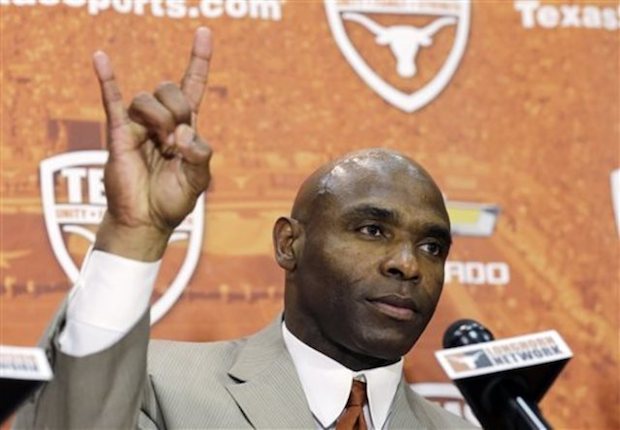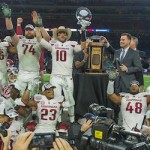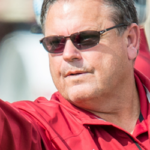 With the hiring of Charlie Strong as its next head football coach, the University of Texas has now had as many head coaches from the state of Arkansas in my lifetime as the University of Arkansas has had.
With the hiring of Charlie Strong as its next head football coach, the University of Texas has now had as many head coaches from the state of Arkansas in my lifetime as the University of Arkansas has had.
On the Longhorn side of the ledger, there’s Fred Akers from Blytheville and Strong from Batesville.
On the Razorback side of the ledger, there’s Ken Hatfield from Helena and Houston Nutt from Little Rock.
When you throw in our state’s history of supplying coaches to the two biggest football programs in the state of Alabama (see last week’s column), maybe Arkansas really is the Cradle of College Football Coaches on a per capita basis. We haven’t done badly for a state of fewer than 3 million people.
That guy named Paul “Bear” Bryant, who grew up in the Moro Bottoms near Fordyce, did pretty well as a coach at the University of Alabama. The state of Alabama (Auburn University in this case) has also benefited from the coaching talents of Camden’s Tommy Tuberville and Fort Smith’s Gus Malzahn. (Read more on the Arkansas to Alabama connection here.)
That fellow named Barry Switzer did OK at the University of Oklahoma. His father, you might remember, was a bootlegger at Crossett.
Are there future NCAA Division I head coaches from Arkansas in the pipeline?
All you have to do is look at the Auburn staff to answer that question. I expect Rhett Lashlee and Tim Horton will be head coaches one of these days.
And then there’s Forrest City native John Thompson, who moved to 2-0 in bowl games at Arkansas State University on Sunday night as an interim head coach.
Charlie Strong, who was born at Batesville in August 1960 and played college football at the University of Central Arkansas in Conway, is the first black head coach at Texas.
On the day Strong was hired as the head coach at Louisville in December 2009, Tony Dungy correctly predicted in an interview with ESPN: “When they see what he can do, you’re probably going to have a lot of people disappointed they didn’t hire him sooner.”
There are few black head coaches at the FBS level, but Arkansas has produced Fitz Hill (an Arkadelphia native and Ouachita Baptist University graduate), who once was at San Jose State, and now Strong. If you bring in the FCS, Pine Bluff native Monte Coleman is the head coach at the University of Arkansas at Pine Bluff and Dennis Winston, who was born at Forrest City and played high school football at Marianna, was the interim head coach last season at Grambling State University.
Back down in Texas, Charlie Strong might want to visit with the 75-year-old Akers regarding the expectations that come with being the head Longhorn. Akers was fired following the 1986 season despite the fact that he had won more games than any other active coach in the Southwest Conference at the time. Akers had a .741 career winning average that was the second best in Southwest Conference history.
Akers, who was a halfback and kicker at Arkansas in 1958-59, began his coaching career on the high school level in Texas. He was a Longhorn assistant under Darrell Royal from 1966-74 before landing his first head coaching job at the University of Wyoming in 1975. Royal and Arkansas’ Frank Broyles both retired following the 1976 season. Arkansas turned to Lou Holtz. Texas turned to Akers, who would serve as head coach for a decade.
Crossett’s Switzer had gone 3-0-1 in games against Royal. Akers did better initially, but in his last five years the Longhorns went 1-3-1 against the Sooners and lost three consecutive games to Texas A&M. Texas also lost bowl games at the end of the 1982, ’83, ’84 and ’85 seasons.
Prior to the 1986 season, Akers told reporters: “We’re going to do the best we can with what we’ve got, and if that isn’t good enough for ‘em, the hell with ‘em.”
After Akers was fired, Alexander Wolff wrote in Sports Illustrated: “There were no cracks in his public demeanor last week, not even after the Longhorns lost 16-3 to Texas A&M on Thanksgiving night to end a 5-6 season – no late-night mumblings to the portraits on the walls of the athletic department offices, no imprecations to his offensive coordinator to kneel with him in prayer. No, Akers left the Nixonian excesses to the survivors in the Southwest Conference: to A&M (read: Autos & Money) coach Jackie Sherrill, who cynically stonewalled members of the press when they printed allegations of a slush fund in his program; and to the plumbers at SMU (read: Spurious Methodist University), who cheat, get caught and merrily cheat again.
“Akers is not a crook, and by the prevailing, abysmal standards of the SWC, that is remarkable. He is guilty only of what in these parts are considered much less forgivable transgressions: He has won, he has won a lot, and he has won more or less honestly. But he hasn’t won while playing the wiseacre, and while whupping A&M and Oklahoma and his annual bowl opponent. In other words, he hasn’t won Texas-style or Texas-big. … At Texas they don’t grade on a curve. The state constitution mandated the building of ‘a university of the first class.’ If something isn’t already there on its fetching campus in downtown Austin, well, then, it’ll be brought in, by golly, cost be damned. The resources for luring excellence are immense.”
After leaving Texas, Akers spent four seasons at Purdue University before retiring from coaching.
While on the subject of native Arkansans who have gone on to lead major college football programs, it should be noted that Charlie Strong is the second Charlie from Arkansas to have done that.
The first was Lewisville native Charlie McClendon – often known as Cholly Mac – who was the head coach at LSU from 1962-79. McClendon compiled a 137-59-7 record at LSU and took his team to 13 bowl games back when there weren’t nearly as many bowls as there are now. He was inducted into the College Football Hall of Fame in 1986 and died in Baton Rouge in December 2001 at age 78.
McClendon played football for Bryant at the University of Kentucky and got into coaching as an assistant at Vanderbilt University in 1952. A year later, he came to LSU as an assistant to Gaynell Tinsley. Paul Dietzel kept him on when the man known as “Pepsodent Paul” became the head coach in 1955. McClendon was part of the staff when LSU won the national championship in 1958 and succeeded Dietzel as head coach at the end of the 1961 season. LSU was in the final Associated Press poll nine times in McClendon’s first 12 years as head coach, going 97-32-5 while winning two Sugar Bowls, two Cotton Bowls and two Orange Bowls.
On Jan. 1, 1966, McClendon’s Tigers broke my heart. I was 6 years old and attending my first Cotton Bowl. Broyles’ Razorbacks were trying to win a second consecutive national championship. My father, who was just a year younger than Cholly Mac, was friends with McClendon. McClendon’s brother, Bill, was among my dad’s quail hunting partners. But I was for the Razorbacks and, in fact, got into trouble the day before the game when I was hesitant to shake Cholly Mac’s hand in the lobby of the old Baker Hotel in downtown Dallas. He was, after all, the enemy in my eyes.
LSU upset Arkansas the next day, denying Broyles that second national title. I cried in the cab we took from the old Cotton Bowl Stadium back to the Baker Hotel, thoroughly embarrassing my 15-year-old sister. McClendon would go on to serve as executive director of the Tangerine Bowl (now the Capital One Bowl) from 1980-81 and would become a beloved figure among college football coaches nationwide as executive director of the American Football Coaches Association from 1982-94. Like his mentor – Paul “Bear” Bryant – he had come out of a small town in Arkansas and done well.
Now, Batesville’s Charlie Strong enhances the reputation of coaches from towns in Arkansas – be it Fordyce, Lewisville, Crossett, Fort Smith, Camden, Blytheville or Helena – who do well on the sport’s biggest stages.
***
Evin Demirel looks at the championship records of some coaches from Arkansas here.













